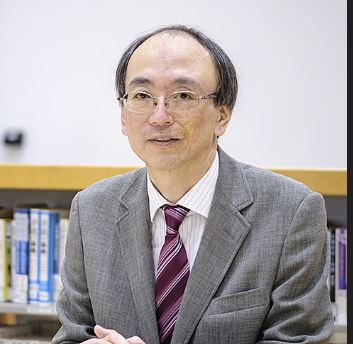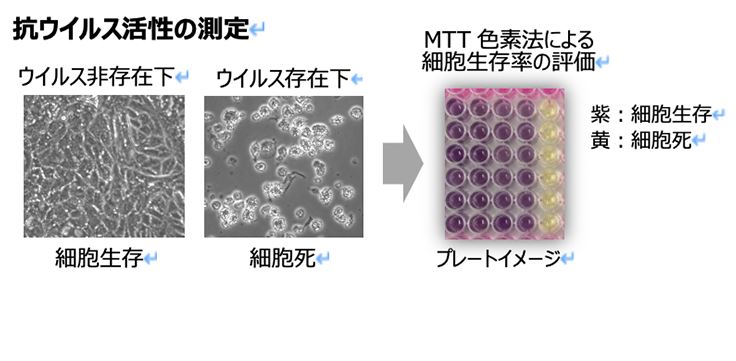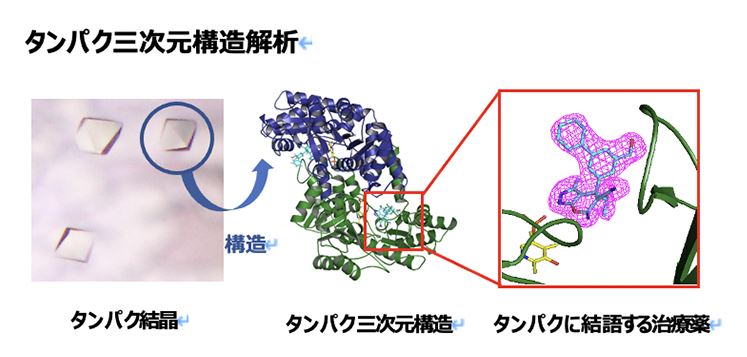大学院説明会
特設ウェブサイト
- トップ
- インタビュー
- 児玉 栄一
一つ一つの点を丁寧につなぎ合わせ
社会ニーズに対応する新たな研究分野の確立へ
若い人の常識を超えた発想に期待
- 医科学専攻
- Medical Sciences
- 災害感染症学分野 教授
- Infectious Disease Professor
- 児玉 栄一
- Eiichi Kodama
- 2023.06.30

発展途上のウイルス感染症治療に異分野融合で新たな道を
●研究の概要を教えてください
ウイルス感染症の治療は発展途上です。症状こそ抑えられるようになりましたが、ヘルペスウイルスやHIVなどウイルスを完全に体内から排除するに至っていません。新型コロナウイルス感染症(COVID-19)の治療薬も有効性・安全性・薬価の問題を抱えたままです。われわれは日本たばこ産業株式会社・米国ギリアド社と共同で1日1回1錠服用を可能としたHIVインテグレース阻害剤の開発、臨床応用に加えて、現在Phase IIIにあるHIV治療薬候補の開発、EBVによるウイルス発がん・白血病に対するアカデミア創薬などに加えて、薬剤耐性機序の解明でも成果を上げてきています。
(HP参照:http://seiryorbt.xsrv.jp/index.html)
高齢者肺炎の原因はほとんどが細菌性と考えられてきましたが、RSウイルス・インフルエンザウイルスなど、小児でも問題になるウイルスが多く関与することが分かっています。少子高齢化が進んでいる社会状況に合わせ、われわれの研究室ではこれまで培ってきた抗ウイルス薬の開発経験を応用し、化合物合成が可能な薬学系研究者、構造生物学者、AIを利用した生物計算学者などの異分野融合型の多様化する社会ニーズに対応するために新たな研究分野の確立を目指しています。
●Please describe the outline of your research.
Treatment of viral infections appears immature and remains to be developing. Although most of the symptoms have been suppressed, viruses such as herpes virus and HIV have not been eliminated. Drugs for the treatment of COVID-19 also contain problematic issues such as efficacy, safety, and cost.
In addition to the development and clinical application of HIV integration inhibitors that enable the use of one tablet once a day in collaboration with Japan Tobacco Inc. and Gilead Inc. of the United States, we are currently developing another candidate for HIV treatment in Phase III, and rational academia drug discovery for viral leukemia caused by EBV. We have also achieved results in elucidating the mechanism of antimicrobial resistance.
Most of the causative pathogens of pneumonia in the elderly have been thought to be bacteria, but it has been reported that many viruses such as RS virus and influenza virus are also involved. In line with the declining birthrate and aging society, our laboratory aims to establish a new research field that responds to the interdisciplinary social needs of pharmaceutical researchers, structural biologists, and AI-based biocomputationalists, applying the experience in antiviral drug development that we have cultivated so far.
●研究室はどのような雰囲気ですか?
教員2人、技術職員4人、修士・博士課程の学生に加えて毎年1、2人の卒業研究生が在籍しています。当研究室では感染性微生物を扱うため、安全性を考慮してコアタイムを設けていますが、社会人大学生にも柔軟に対応しています。例として病院勤務の社会人学生も教員と相談しつつ既定の期間内に博士課程を修了しています。定期的に抄読会と研究成果報告会を行っていて、複数の発表機会があります。学生や教員、技術職員の間に垣根はなく、気軽に質問したり、雑談したりする姿がよく見られます。研究以外にも、就職活動や資格取得、進路など、相談やサポートが可能です。
●What is the atmosphere like in your laboratory?
In addition to 2 faculty members, 4 technical staff, and master and doctoral course students, 1-2 graduating research students are enrolled every year. Since our laboratory handles pathogens, we set core time for safety measures, but we also flexibly respond to working university students, such as clinical staffs. We regularly hold research meetings for reading papers and their research reporting, resulting that there are multiple opportunities for presentations. There are little barriers between students, faculty members, and technical staff, and they often and easily ask questions and chat. In addition to research, consultation and support are available for job hunting, qualification acquisition, career paths, etc.
積極性と決断力を磨き、目の前の今に集中して一歩ずつ
●学生にどのようなことを期待しているかなども含め、進学希望者へのメッセージをお願いします
研究やその関連業務など、仕事からしか学ぶことができない「積極性」と「決断力」を磨いてほしいです。言葉遊びのようですが、「積極的に」やらないと自ら考え、責任を持って「決断」する、でもいいと思います。過去を後悔、将来を心配しても、現実には現在しか生きられないので生産的ではありません。今に集中して一歩ずつ進んでください。
●What is your message to prospective students, including what you expect from them?
We would like you to get and sharpen your “proactivity” and “decisiveness” that can only be learned from research and related work. Although it looks like a play on words, but I ask to think by yourself that you quit it “proactively” and indeed take responsibility for “making a decision” for instance. Regretting the past and worrying about the future are not productive because, in real world, we can only live in the present. Focus on the present and take it one step at a time.
社会人院生も多数 修了後は常識にとらわれず可能性を試して
●修了後はどのような進路がありますか?また、修了生はどのように活躍していますか?
これまでの修了生は、企業・医療機関・大学などの研究機関に就職、留学などさまざまです。学位を取った後に助教を飛び越えていきなり講師以上の大学教員になった学生も2人います。常識にとらわれず、いろいろな可能性を試してみましょう。
●What kind of career paths are available after completion of the program? How are graduates active?
Graduates have worked for research institutions such as companies, medical institutions, and universities, and studied abroad. There are two students who, after obtaining their degrees, jumped over assistant professors and suddenly became faculty staffs at the level of lecturers or higher. Please try various possibilities.
●病院や企業に勤務しながらの修学は可能でしょうか?
社会人大学院生の方がむしろ多く、問題ありません。
●Is it possible to study while working at a hospital or company?
There are rather many working graduate students, so there is no problem.
分野の枠を超え、グローバルな視点が身に付く質の高い教育
●東北大学の良いところは?
東北大学は、建学以来の伝統である「研究第一」と「門戸開放」の理念を掲げ、各研究科や研究所が専門分野の枠を超え互いに協力し、国内外の研究施設と連携して世界最先端の研究を行っています。海外留学生も多く、研究や学生生活を通してグローバルな視点や考え方を身に付けられるなど、質の高い教育の機会に恵まれています。実際、卒業生は大企業や本学・他大学で要職に就いていて、日本の経済、医療や研究に大きく貢献しています。
大学院の講義は、対面に加えてオンライン講義も充実し、学生や社会人大学院生の忙しい研究生活に配慮しています。大学院生自身が企画する研究発表会(大学院生リトリート)、われわれの研究室が主催する国立感染症研究所や国立国際医療研究センターとの合同セミナーなど、他施設のスタッフや大学院生と交流できる機会が設けられていて、異なる専門性を持つ研究者と意見交換できます。
広大なスペースと緑豊かな各キャンパスは、杜の都・仙台の代表です。東京から新幹線で1時間半、仙台空港からも快速列車17分で仙台駅です。仙台駅から星陵キャンパスまでは朝の混み合った時でもバスで20分程度です。
●What is the best thing about Tohoku University?
Tohoku University upholds the traditions of “research first” and “open door policy,” which have been traditions since its founding, and each graduate school and research institute collaborates with each other beyond the boundaries of specialized fields to conduct world-leading research in collaboration with research facilities in Japan and overseas. There are many international students, and we are blessed with high-quality educational opportunities, such as acquiring a global perspective and way of thinking through research and student life. In fact, graduates get important positions in large companies, our and other universities, and contribute greatly to the economy, medical care, and research of Japan.
In addition to face-to-face lectures, graduate school lectures are also enriched with online lectures for the busy research lives of students and working graduate students. There are opportunities to interact with staffs and graduate students from other facilities, such as research presentations (the Graduate Student Retreats) planned by graduate students themselves and joint seminars with the National Institute of Infectious Diseases and the National Center for Global Health and Medicine, and researchers with different specialties can exchange opinions.
Each campus with vast spaces and greenery is a representative of Sendai. It takes one and a half hours by bullet train from Tokyo and 17 minutes by rapid train from Sendai Airport to Sendai Station. It takes about 20 minutes by bus from Sendai Station to the Seiryo Campus even when it is crowded in the morning.
 実際に行っている研究の例
実際に行っている研究の例
研究を始めた頃、ウイルスハンティングという言葉が出てきていて、文字通り新しいウイルスが発見されていました。感染症は誰かが研究しなければならない重要な研究分野ですが、研究者にも危険性があり、私は今でも嫌です。それがかえって研究の安全性につながっています。
ウイルス研究のように私にとって不利なこと、やりたくないことも、嫌々ではなく、やるだけやってみようと考えてきました。3年も継続すると不思議なことに興味を持てるようになります。消化器内科医を目指していたのですが、臨床では膠原(こうげん)病、結核、救急にも対応し、微生物学に異動時には当時、不治の感染症で恐れられていたHIVの治療薬の研究など、むしろ避けて通りたい業務に就いてきました。しかし、それが留学や京都大学ウイルス研究所(現在は医生物学研究所)への異動の機会につながりました。本学異動後も、救急を含めた幅広い臨床経験から東北メディカル・メガバンク機構の地域医療支援、そして災害医療につながり、遠回りをしながらも研究を継続しています。種々のウイルスの取り扱い経験から新型コロナウイルスの研究も可能ですし、抗がん剤の開発にも役立っています。
「Connecting the Dots」という言葉が、スティーブ・ジョブズの講演(2005年スタンフォード大学卒業式)の中に出てきます。関連がないと思われてきた一つひとつの点(経験)であっても丁寧につなぎ合わせ、自分独自の新しい研究分野を創り出してみましょう。
ウイルス治療学に限らず、アカデミア創薬はまだ途上です。新しい分野は異分野のバックグラウンドを持っている若い人の常識を超えた発想から爆発的に発展します。一緒に新しいことをしてみませんか。
When I started my research, the term “virus hunting” was popping up, and novel viruses were actually being discovered. Infectious diseases are an important area that someone must continuously study, but researchers also face dangers, which I still hate to this day. Fortunately, this leads to the safety of research.
I have been thinking about doing things that are disadvantageous to me or that I don't want to do, such as virus research, as much as I can, rather than being reluctant. If you continue as long as three years, you will be interested in these research areas. In fact, I would become a gastroenterologist, but I dealt with collagen diseases, tuberculosis, and emergencies, and when I moved to Department of Microbiology, I was working in a job that I rather wanted to avoid, such as research for HIV, which was feared at the time as an incurable infectious disease. However, this led to the opportunity to study abroad and transfer to the Institute for Virus Research (now integrated into the Institute for Life and Medical Sciences), Kyoto University. Even after moving to Tohoku University, I have continued my research despite taking a detour, using my extensive clinical experience, including emergency, to lead to regional medical support and disaster medical care at the Tohoku Medical Megabank Organization. Our experience in handling various viruses enables us to conduct research on the novel coronaviruses, and it is also useful for the development of anticancer drugs.
“Connecting the Dots”, Steve Jobs provided a speech in 2005 commencement ceremony at the Stanford University. Let's carefully connect each point (experiences) that has been thought to be unrelated and create a new research field of your own.
In addition to viral therapeutics, drug discovery in academia is still in progress and on halfway. New fields develop explosively from ideas that go beyond the common sense of young people who have backgrounds in different fields. Why don't you try something new together?
- PROFILE
- 医科学専攻
- Medical Sciences
- 災害感染症学分野 教授
- Infectious Disease Professor
- 児玉 栄一
- Eiichi Kodama
1990年、卒後すぐに福島県立医科大学大学院内科学専攻に進学し、自己免疫疾患とウイルスの関連を研究。大学院修了後、同大助教。米国アラバマ大学とNIH/NCIへの2度の留学後、1999年から京都大学・ウイルス研究所、2009年に東北大学病院、東北メディカルメガバンク機構を経て2016年から現職。医学研究科、大学病院、同機構を兼務し、一貫して抗ウイルス剤の開発とその耐性について研究。これらの知見をウイルス発がんやパンデミック制御などの多分野に応用している。
After graduation of a medical school in 1990, I belonged to the Department of Internal Medicine at the Fukushima Medical University as a graduate school student, and focused on the relationship between autoimmune diseases and the possibly causative viruses. I, then, remained in the academia as an assistant professor. After studying abroad twice, the University of Alabama and the NIH/NCI in the United States, I worked at the Institute for Virus Research, Kyoto University for 10 years. In 2009, I moved to the Tohoku University Hospital and the Tohoku Medical Megabank Organization, and has been in the current position since 2016. I have been working concurrently at the Graduate School of Medicine as well as the International Institute of Disaster Science, and have consistently conducted research on the development of antiviral agents and the resistance. We are applying these findings to various fields such as viral carcinogenesis and pandemic control.
●関連リンク
skb96*irides.tohoku.ac.jp (「*」を「@」に変換してください。Please convert "*" to "@")